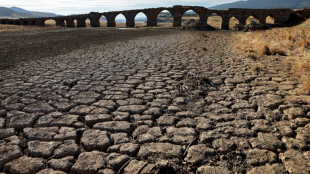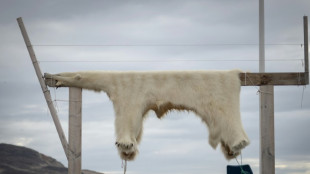
-
 NATO's 'Trump whisperer' treads carefully on Greenland and defense
NATO's 'Trump whisperer' treads carefully on Greenland and defense
-
All eyes on Democrats as US barrels toward shutdown deadline

-
 Spain to face increasingly 'severe' droughts: report
Spain to face increasingly 'severe' droughts: report
-
US federal judge orders agencies to rehire fired workers

-
 Pope marks 12 years in job in hospital - with cake - but future uncertain
Pope marks 12 years in job in hospital - with cake - but future uncertain
-
Georgian designer Demna leaves Balenciaga for Gucci

-
 Diet puts Greenland Inuit at risk from 'forever chemicals': study
Diet puts Greenland Inuit at risk from 'forever chemicals': study
-
Sherratt wants Wales to balance 'heart and brain' in Six Nations send-off with England

-
 'Blood Moon' rising: Rare total lunar eclipse tonight
'Blood Moon' rising: Rare total lunar eclipse tonight
-
UK salvage teams board North Sea crash vessels

-
 Putin raises 'serious questions' on Ukraine truce plan
Putin raises 'serious questions' on Ukraine truce plan
-
Townsend upbeat as Scotland head to France for tough Six Nations finish

-
 World MotoGP champion Martin to miss US race in new injury setback
World MotoGP champion Martin to miss US race in new injury setback
-
Rays dump plans for new MLB ballpark in St. Petersburg

-
 IOC strike $3 bn deal with NBC in US up to 2036 Olympics
IOC strike $3 bn deal with NBC in US up to 2036 Olympics
-
Duterte case seen as a 'gift' for embattled ICC

-
 Peru ex-president Castillo hospitalized on Day 4 of hunger strike
Peru ex-president Castillo hospitalized on Day 4 of hunger strike
-
Martinez climbs to Paris-Nice stage win, Jorgenson takes lead

-
 Donatella Versace, fashion icon who saved slain brother's brand
Donatella Versace, fashion icon who saved slain brother's brand
-
EU 'open for negotiations' after latest Trump tariff threat

-
 End of era as Donatella Versace gives up creative reins of Italian brand
End of era as Donatella Versace gives up creative reins of Italian brand
-
Jockey great Dettori files for bankruptcy after UK tax case

-
 Impressive Fact To File gives Mullins' eve of Gold Cup confidence-booster
Impressive Fact To File gives Mullins' eve of Gold Cup confidence-booster
-
Court upholds jail terms for relatives of murdered UK-Pakistani girl

-
 Ireland's Easterby laments 'disappointing' Galthie comments after Dupont injury
Ireland's Easterby laments 'disappointing' Galthie comments after Dupont injury
-
Sweden to hold talks on countering soaring food costs

-
 Frenchman Martinez climbs to Paris-Nice fifth stage win
Frenchman Martinez climbs to Paris-Nice fifth stage win
-
EU parliament roiled by graft probe linked to China's Huawei

-
 UEFA to mull penalty rule rethink after Alvarez controversy
UEFA to mull penalty rule rethink after Alvarez controversy
-
Turkey insists foreign fighters be expelled from Syria: source

-
 Asteroid probe snaps rare pics of Martian moon
Asteroid probe snaps rare pics of Martian moon
-
White House withdraws vaccine-skeptic nominee to lead US health agency

-
 Syria leader signs constitutional declaration, hailing 'new history'
Syria leader signs constitutional declaration, hailing 'new history'
-
Azerbaijan, Armenia say peace deal ready for signing

-
 EU, US eye greater energy ties amid Trump frictions
EU, US eye greater energy ties amid Trump frictions
-
Canada rallies against Russian 'aggression' as new US tone splits G7

-
 Roberts moves to wing for winless Wales against England in Six Nations
Roberts moves to wing for winless Wales against England in Six Nations
-
NATO's 'Trump whisperer' heads to White House for tough talks

-
 UK police extend North Sea crash captain's detention
UK police extend North Sea crash captain's detention
-
US envoy in Moscow to present Ukraine truce plan

-
 Donatella Versace to give up creative reins of brand after 28 years
Donatella Versace to give up creative reins of brand after 28 years
-
Trump threatens huge tariffs on European wine, other alcohol

-
 Meta tests 'Community Notes' to replace fact-checkers
Meta tests 'Community Notes' to replace fact-checkers
-
Stock markets find little cheer as Trump targets champagne

-
 Brazil mine disaster trial ends with claimants hopeful of justice
Brazil mine disaster trial ends with claimants hopeful of justice
-
England fast bowler Wood out for four months after latest injury blow

-
 Mbappe returns to France squad as PSG's Doue earns first call-up
Mbappe returns to France squad as PSG's Doue earns first call-up
-
New corruption scandal roils EU parliament

-
 Kimmich extends Bayern contract until 2029
Kimmich extends Bayern contract until 2029
-
UK seeks tougher term for father jailed over daughter's murder


'We want peace' say Colombians displaced by fresh guerrilla violence
Gladis Angarita, 62, fled her village in northeast Colombia in terror last Friday, among thousands escaping a fresh guerrilla onslaught that has claimed dozens of lives in just a few days.
She had no time to pack, escaping with little more than the clothes on her back and her asthma medication.
"There was a lot of shooting," Angarita told AFP in the town of Tibu, on the border with Venezuela, where she found refuge at a community center with about 500 others -- including many children and elderly people.
"Out of fear, we left everything" behind, she lamented, sitting on a log and sucking on her inhaler. "I don't even have any pajamas."
Colombia's National Liberation Army (ELN) -- the largest guerrilla group still active in the conflict-riddled South American country -- launched a bloody attack last Thursday in the northeastern Catatumbo region.
It targeted civilians and dissident fighters of a rival formation comprised of ex-members of the now-defunct FARC guerrilla force who kept fighting after it disarmed in 2017.
Authorities report at least 80 people killed by Sunday, some two dozen injured and 5,000 displaced in an upheaval reminiscent of the bloody 1990s, when Colombia endured the worst period in its six-decade-old armed conflict.
Nine people were also killed in clashes in recent days between the ELN and the Gulf Clan, Colombia's biggest drug cartel, in another northern region of the country.
The violence prompted President Gustavo Petro Friday to call off negotiations with the ELN that had been part of his stated quest for "total peace."
- 'We want peace' -
"We want peace!" Angarita said shortly after arriving in Tibu, a town in the Colombian region with the world's biggest drug plantations, according to the UN.
"The war has to end," she sighed.
A 2016 peace pact with FARC had sought to end the longest-running war in the Americas.
But leftist guerrillas, right-wing paramilitaries, drug gangs and state forces remain in open conflict in parts of the country as fighting rages over illegal mining and drug resources and trafficking routes.
The ELN, which has roughly 5,800 fighters and a major stake in the drug business, has taken part in failed negotiations with Colombia's last five governments.
Since 1964, the conflict is estimated to have resulted in some nine million Colombians either killed, disappeared or forced to leave their homes, according to authorities.
Last November, the Norwegian Refugee Council (NRC), a humanitarian organization, said at least 1.5 million people have been displaced since the deal with the FARC in 2016.
- Worse than Venezuela -
On Saturday, Tibu was a hive of frantic activity, its bus terminal bursting with people desperate to flee to other parts of Colombia, or further afield.
"My heart aches for Catatumbo... for the whole country. There are many innocent people paying the price for war," sobbed Carmelina Perez, also 62, as she used a piece of cardboard to shield herself from the harsh sun.
Perez said she fled with her husband and the grandchildren to Tibu "in panic." She worries desperately about her daughters who stayed behind in their village.
Around Perez at the shelter, hammocks hang from trees for people to sleep in and children run around while women prepare a collective soup in a large pot over a fire.
Fellow refugee Luis Alberto Urrutia, a 39-year-old Venezuelan, said he had fled the economic and political crisis in his own country seven years ago to work in the coca plantations of Catatumbo.
Now he is on the move again, and contemplating a return home.
"This is more difficult than even in Venezuela," Urrutia told AFP in Tibu.
"There is danger everywhere, but more even here. There are many dead," he said of the events of the last few days.
O.Lorenz--BTB
